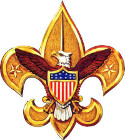Using Tools
The PLC knew that new scouts would be joining the troop at the end of the month. They were trying to come up with ideas on what to include in troop meeting agendas to get the new guys off to a good start. I sat there tracking the ideas in my head as I came up with them, ready to offer a couple if the SPL asked.
But just then, an Instructor pulled out this sheet and they had their skills training sessions done for the next two months.
They chose not to do whipping and fusing rope since they'd be inside, but decided knots would be a good choice since our next campout requires them to lash together a drive-in movie screen.
I've found that coming up with ideas immediately when asked is not a common skill amoung scouts (nor any population). But, with a reminder list of ideas, they are very good at choosing the ones that would be most fun and organizing and expanding on them. So, having a list of the advancement requirements for new scouts, they have no trouble choosing ones to do in troop meetings. I believe this is using the tools available to your advantage.
In this instance, they chose not to do whipping and fusing rope since they'd be inside, but decided knots would be a good choice since our next campout requires them to lash together a drive-in movie screen. Older scouts will practice lashing and hopefully design a screen while 6 scouts teach the new scouts two half-hitch and taut-line hitch. At the second meeting, they plan to have a knot-tieing race or relay to keep it fun. When we camp, the new guys should be able to contribute to the project right away.
Providing usable tools for the scouts is a Scoutmaster's job. Training is certainly an important tool. The gear we use: axes, saws, tents, rope, matches, bandages, ... and so on are obviously tools. Scouts have little problem mastering those physical tools and using them to accomplish tasks. The more difficult parts of Scouting, the leadership, citizenship, and character building, also require tools. Good role models, discussions of right and wrong, and training sessions are all helpful. But, I think a set of tools can make the job easier without detracting from the goals.
Whether scouts are planning a campout or a troop meeting or a year of activities, having tools to work with helps them accomplish the goal. If the tools are used as prompts and suggestions rather than cookie-cutter answers, the scouts gain in skill.
Scout on
But just then, an Instructor pulled out this sheet and they had their skills training sessions done for the next two months.
They chose not to do whipping and fusing rope since they'd be inside, but decided knots would be a good choice since our next campout requires them to lash together a drive-in movie screen.
I've found that coming up with ideas immediately when asked is not a common skill amoung scouts (nor any population). But, with a reminder list of ideas, they are very good at choosing the ones that would be most fun and organizing and expanding on them. So, having a list of the advancement requirements for new scouts, they have no trouble choosing ones to do in troop meetings. I believe this is using the tools available to your advantage.
In this instance, they chose not to do whipping and fusing rope since they'd be inside, but decided knots would be a good choice since our next campout requires them to lash together a drive-in movie screen. Older scouts will practice lashing and hopefully design a screen while 6 scouts teach the new scouts two half-hitch and taut-line hitch. At the second meeting, they plan to have a knot-tieing race or relay to keep it fun. When we camp, the new guys should be able to contribute to the project right away.
Providing usable tools for the scouts is a Scoutmaster's job. Training is certainly an important tool. The gear we use: axes, saws, tents, rope, matches, bandages, ... and so on are obviously tools. Scouts have little problem mastering those physical tools and using them to accomplish tasks. The more difficult parts of Scouting, the leadership, citizenship, and character building, also require tools. Good role models, discussions of right and wrong, and training sessions are all helpful. But, I think a set of tools can make the job easier without detracting from the goals.
Whether scouts are planning a campout or a troop meeting or a year of activities, having tools to work with helps them accomplish the goal. If the tools are used as prompts and suggestions rather than cookie-cutter answers, the scouts gain in skill.
Scout on
Posted: 8:25 02-03-2009 391
Comment or Question about this page:
Scouting 2025 - Ask a Question - Add Content
Just for Fun: Socializing merit badge




This site is not officially associated with Scouting America
Find more Scouting Resources at www.BoyScoutTrail.com



Follow Me, Scouts
Recent Comments